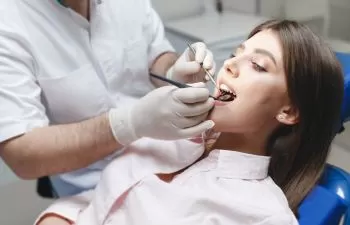
You may know calculus as the hard subject in school, but mastery of it can lead to an exciting future in several different fields. Calculus on your teeth is also very hard. However, if it isn’t removed, it can lead to an unhappy future with poor oral health. Tartar may be a more familiar term. It is the hard, brownish-yellow buildup around the gum line that can ruin the health of your smile.
How Calculus Forms
Everyone’s mouth is full of bacteria. Some of it is good and necessary for oral health. Some is bad and can lead to problems. Plaque is a clear sticky substance the adheres to your teeth and gums. It contains bad bacteria. Ideally, every time you brush and floss, you remove the plaque; however, that is not always the case.
If you don’t brush regularly, plaque can build up. It also builds up in areas that are hard to reach with brushing and flossing. Over time, the plaque hardens into the substance we call calculus, or tartar. As it accumulates around the tooth, it also pushes the gum away from the tooth. Calculus adheres to the tooth and is not removed by brushing or flossing. It can only be completely removed by a professional cleaning. If neglected, this buildup will result in periodontal disease and could lead to tooth loss.
Calculus Removal
Special instruments are used to remove calculus from the teeth. High tech scalers are used to shatter the hardened substance, while leaving the tooth unharmed. Hand instruments may also be used. In severe cases, the roots of the tooth may need to be planed. Much like wood is planed to make the surface smooth, planing the tooth root makes it smooth and allows the gum to reattach.
Ideally, calculus buildup will not be a problem with regular visits to your dentist. There are certain individuals who may need to have their teeth cleaned more than once a year. Regularly scheduled cleanings will help stop calculus from becoming a problem. Call Barrera Advanced Dentistry today to schedule your professional dental cleaning and calculus removal.
Posted on behalf of Barrera Advanced Dentistry
